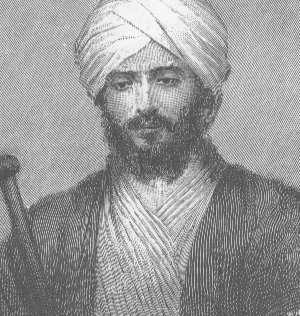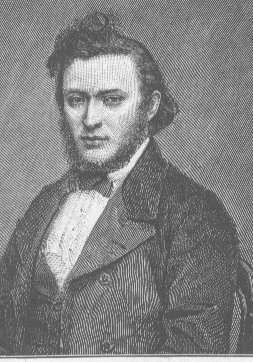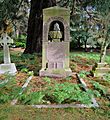Gottlieb Wilhelm Leitner facts for kids
Gottlieb Wilhelm Leitner (born October 14, 1840 – died March 22, 1899) was a very smart British scholar who studied the languages and cultures of the East, especially Asia. He was also known as Gottlieb William Leitner.
Contents
Early Life and Amazing Language Skills
Gottlieb Wilhelm Leitner was born in Pest, Hungary, on October 14, 1840. His family was Jewish. When he was young, his father passed away. His mother then married Johann Moritz Leitner. Gottlieb and his sister Elisabeth took the name Leitner.
Gottlieb showed an amazing talent for languages from a young age. When he was eight, he went to Constantinople to learn Arabic and Turkish. By the time he was ten, he could speak Turkish, Arabic, and most European languages fluently.
At fifteen, he became an Interpreter (First Class) for the British army during the Crimean War. He even had the rank of a colonel! After the war, he wanted to become a priest. He went to study at King's College London.
It is also said that he adopted a Muslim name, Abdur Rasheed Sayyah, during his travels in Muslim countries. Sayyah means a traveller in Arabic.
Leitner was a brilliant linguist. People say he knew about fifty languages. He could speak many of them very well. At nineteen, he started teaching Arabic, Turkish, and Modern Greek. By the age of twenty-three, he became a Professor of Arabic and Muslim Law at King's College London.
Working in British India
Around 1864, when he was 26, Leitner became the Principal of Government College University (Lahore). This was in British India, which is now Pakistan. He played a big part in starting the University of the Punjab in 1882.
He also helped create many schools, reading groups, public libraries, and academic magazines. At the same time, he studied the cultures of the Indian subcontinent. He wrote a detailed book in Urdu called History of Islam. He got help from a Muslim scholar named Maulvi Karim-ud-Din. This book was published in two parts in 1871 and 1876.
Later, when Queen Victoria became Empress of India in 1876, Professor Leitner created her new official title: Kaysar-i-Hind. He stopped working for the Indian Civil Service in 1886.

Return to Europe and New Projects
In the late 1870s, Leitner went back to Europe. He studied at Heidelberg University in Germany. He also worked for the governments of Austria, Prussia, and Britain. His main goal was to create a place in Europe to study Eastern languages, cultures, and history.
When he returned to England in 1881, he looked for a good spot for his new school. In 1883, he found the empty Royal Dramatic College in Woking. It was a perfect building for his plans.
Building the Shah Jahan Mosque
For the benefit of Muslim students, Leitner asked for a mosque to be built. The Shah Jahan Mosque, Woking was finished in 1889. It was one of the first mosques in Western Europe. It was also the first mosque built specifically for prayer in Britain. This mosque is still standing today.
It was built in a style called Indo-Saracenic. It was named after Sultan Shah Jahan, Begum of Bhopal (1868–1901). Shah Jahan Begum gave a lot of money to help build the mosque. She also gave money to help start the "Muhammadan Anglo-Oriental College" in Aligarh, which later became the Aligarh Muslim University.
Images for kids
 | Valerie Thomas |
 | Frederick McKinley Jones |
 | George Edward Alcorn Jr. |
 | Thomas Mensah |



